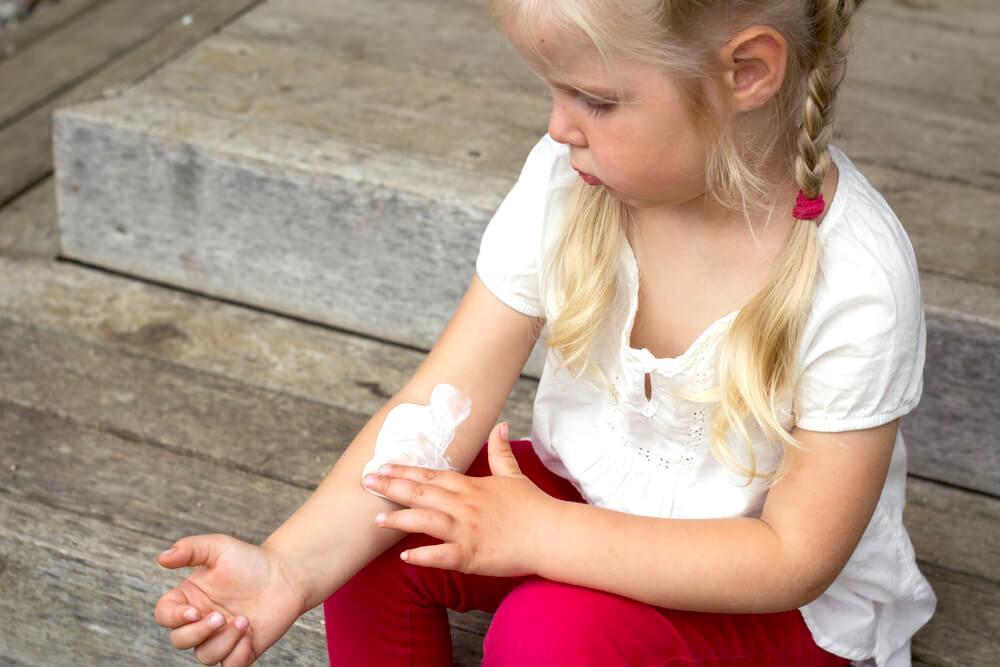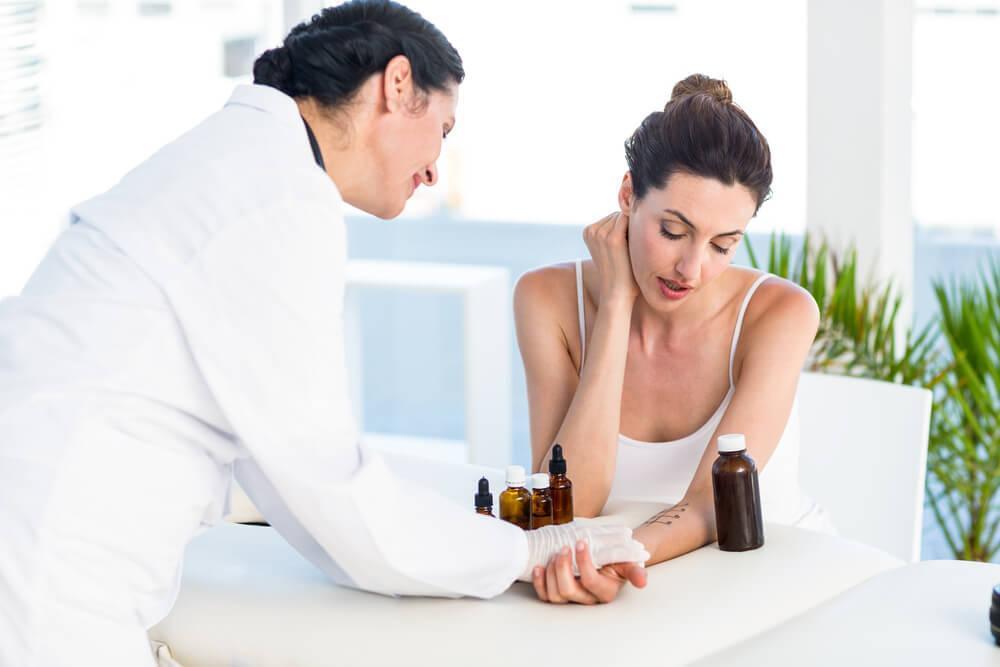Itchiness, rash, redness and swollen skin… Does this sound like something that often happens to you?
Allergies tend to occur when your skin comes into contact with a stimulus that your body doesn’t agree with.
In response, your immune system gets activated, releasing a large dose of histamine – a potent substance that can cause all sorts of manifestations on your body.
Before you start freaking out about this newfound realization, you might find it comforting to hear that skin allergies are extremely common across ages and genders.
The good news is that majority of skin allergies tend to go away on their own and, in most cases, require only mild treatment that you can perform at home.
Even so, it is important to inform yourself on the nature of your condition, but also to find out about all the treatments you can pursue to alleviate the unpleasant symptoms.
Likewise, you should learn all about potential allergens, so you can eradicate your skin condition long-term.
Recognize Your Symptoms
Before your begin treating your allergy, it is important to identify the symptoms.
This is because your course of action will largely depend on the allergy manifestations you are experiencing.
And if you’re not aware of how allergies manifest themselves on the skin, these are some of the most common symptoms that may occur:
- Redness and irritated skin
- Itchiness
- Flaky, cracked, dry skin
- Swelling
- Rash
- Tingling
- Thick, leathery skin
- Blisters and bumps
Sometimes, multiple symptoms appear simultaneously; some people might even experience pain alongside the usual symptoms.
The allergy can either be localized, affecting a small part of the skin, or it can spread on larger areas on your face and body.
Most of these symptoms tend to disappear in a matter of days, although sometimes they can turn out to be chronic or indicative of a more serious condition.
Whatever symptoms you may be experiencing, your primary goals should be to minimize the discomfort on the affected area, then help the skin to heal.
Avoid Contact
Whatever the nature of your skin allergy, there is one universal rule you should stick to: do not touch the affected area.
Picking at your rash or scratching itchy skin is a surefire way to exacerbate your condition.
Moreover, by touching your skin, you can transfer the bacteria, which can then cause the infection to spread elsewhere on your body.
Also, if you already know what is causing your allergy, whether that’s a certain type of food or chemical, it goes without saying that you shouldn’t come anywhere near it.
It’s also important to let the affected area of your skin breathe.
For example, if you are experiencing symptoms on your face, steer clear of heavy makeup and chemicals-laden cosmetic products, as they will only aggravate the irritation.
Alternatively, if the skin allergy is located somewhere on your body, you might want to avoid tight clothes and instead wear loose, breathable pieces made from natural fabrics until your skin recovers.
This way, you won’t run the risk of chafing and making your allergy ten times worse.
Cool Down Your Skin
As soon as you notice skin allergy symptoms, you should take measures to cool down the irritation.
There are several ways to soothe the burning irritation.
The quickest one is probably just to take a cold shower.
Not only will the frigid water help help reduce inflammation, it will also combat the root of the allergic reaction by shrinking the blood vessels and stopping the histamines from coming out.
Alternatively, you can cool down a smaller area of affected skin allergy by applying cold compresses.
You can also amp up your DIY cooling method by infusing ice with cucumber slices or mint leaves.
These natural ingredients will be beneficial for calming your skin and cooling it down.
Replenish it with Moisture
If the source of your skin allergy is dry skin, then it’s of crucial importance that you keep your skin hydrated throughout the day.
There are several ways you can do this.
One is with store-bought moisturizers, which we use in everyday skin care.
However, since some cosmetic products contain ingredients that might exacerbate your condition, try to stick with gentle, fragrance-free creams designed for people with sensitive skin.
When it comes to ingredients that have the potential to alleviate your condition, look out for Aloe Vera and cucumber (they help cool down and soothe the skin), as well as urea and lactic acid, as these two nutrients are potent for locking in moisture in your skin.
Make sure to apply the moisturizer when your skin is damp, as this will prevent that initial dry out.
Also, remember to slather on moisturizer multiple times throughout the day, as irritated skin tends to dry out faster.
If you live in a cold or dry climate and often experience patchy, irritated and itchy skin, you might want to invest in a humidifier.
This will help retain the moisture in the air and reduce the chances of your skin developing irritation.
Try DIY Remedies
Sometimes, the best thing we can do for our allergies is to treat our skin with the very best from Mother Nature.
When it comes to allergies, there are many nature-derived ingredients that can act as powerful agents for eradicating the symptoms.
For example, olive oil is packed with Vitamin E and various antioxidants that can help heal the affected areas of the skin.
Apple cider vinegar is known for its anti-inflammatory and anti-fungal properties, which can be greatly beneficial in treating rashes and other types of skin irritation.
Another amazing remedy for treating skin allergies is tea tree oil, which is powerful in reducing itchiness, bug bites and numerous other kinds of inflammation.
Ground oatmeal can also be used to reduce inflammation and help with itchy skin. Simply soak the irritated area into a mixture of oatmeal and lukewarm water and you will feel it work its magic in a matter of minutes.
Give Over-the-counter Medicine a Go
If natural ingredients aren’t bringing relief to your skin, then you might want to nip to the pharmacist’s and get something a little stronger to help alleviate your allergies.
And if you’re not sure what exactly to ask for, some of the most common over-the-counter medicine for skin allergies include:
- Antihistamines
- Hydrocortisone creams
- Various other topical ointments, like calamine lotion
If the itch or rash is persistent, your doctor might even suggest applying a corticosteroid, such as hydrocortisone cream.
These powerful agents will help minimize allergic reaction; they will also calm irritated and inflamed skin where home remedies don’t cut it.
Call Your Healthcare Provider
If neither homemade remedies nor OTC medicine is helping, and your condition hasn’t changed or is getting worse, you should look into getting help from a medical professional.
Consider calling your doctor if you notice one or more of the following:
- The irritation has spread to large areas of your body
- The allergy lasts for more than a week or two
- Shortness of breath
- Fever
- Itchiness in the throat
- Dizziness
- Confusion
- Severe pain in head and neck
- Vomiting and diarrhea
Most skin allergies are harmless; however, in some cases, they can be a sign of more serious conditions.
To make sure you nip the problem in the bud, call a medical professional as soon as you notice one of the aforementioned symptoms.
Minimize Environmental Triggers
Finally, treating your acute skin condition is only half of the battle.
In order to make sure you don’t end up in the same scenario, it’s crucial that you take preventive measures against skin allergies.
And it all boils down to not exposing the skin to allergens that trigger the inflammation.
The hardest part is pinpointing the exact cause of your allergy. Even if this isn’t always possible, you can still narrow down the list of potential triggers and learn how to avoid them.
Allergens that causing your skin to act out are often environmental.
In day-to-day life, potential aggressors lurk at every step, including your most immediate surroundings.
Some of the most common allergy triggers found in households include:
- Nickel (material found on zippers, clutches, jewelry and other things)
- Laundry detergents and softeners
- Hair dye
- Certain fabrics, like polyester or wool
- Fabric dye
- Chemicals
- Adhesives
- Plants, like poison ivy
- Latex
- Animal hair
Moreover, the allergen in question might be hiding somewhere in the skincare you apply every day.
To make sure you’re not using products that have an adverse effect on your skin, try ditching cosmetics that contain harmful chemicals. Two damaging ingredients you are most likely to find in your beauty products include methychloroisothiazolinone and methylisothiazolinone.
Also, always go for fragrance-free cleansers, toners and lotions – the same applies for deodorants, tissues and fabric softeners.
Look into Your Diet
Sometimes, skin allergies are caused by what we eat.
Just like with any other allergen, when we bite into something our body considers to be a threat, out immune system reacts by releasing a considerable amount of histamine.
You might be thinking how it will be virtually impossible to identify the exact ingredient that is triggering your allergies, considering the array of different foods we tend to eat in one day.
Fret not – you will be pleased to hear that most skin allergies are caused by the following foods:
- Milk
- Eggs
- Peanuts
- Soy
- Wheat
- Tree nuts
- Fish
- Shellfish
If you suspect one of these ingredients might be giving you a hard time, maybe you should look into starting a food diary. This will help you determine which exact ingredient is the irritant through a process of elimination.
Start by removing all the potential triggers from your diet. Then add just one every day and track any changes that might occur in your body.
Make Tweaks in Your Lifestyle
Other than food and household items, there are also more inconspicuous triggers that cause skin allergies.
For example, skin irritation can arise if you have been affected by bacterial, viral, fungal or parasitic infections.
Other times, it can be caused by stress and anxiety.
Inflamed skin can also be a result of excessive perspiration, which may occur if you regularly exercise, or if your work involves considerable amounts of physical activity.
Finally, it might be the climate that is causing your skin to flare up.
Exposure to cold, dry air, as well as scorching hot sun can be a trigger for allergic reactions.
Fortunately, there are ways to address these common lifestyle triggers.
You can minimize stress levels by getting enough sleep and maintaining a balanced diet.
Next, whenever you exercise, you can reduce the chances of causing skin irritation by wearing breathable workout gear made out of cotton. Also, make sure to rinse the sweat off your body as soon as you finish exercising (although you should avoid doing so with scorching hot water).
Finally, try not to spend prolonged period of time in direct sunlight – harmful UV rays can easily make your allergies flare up.
Hopefully this guide has made you realize that skin allergies are nothing to be afraid of, and that most of them can easily be cured with the appropriate treatment. Also, now that you have learned everything about potential triggers, we are sure you will be able to isolate and remove them from your everyday surroundings and make skin allergies disappear once and for all.










Leave A Comment